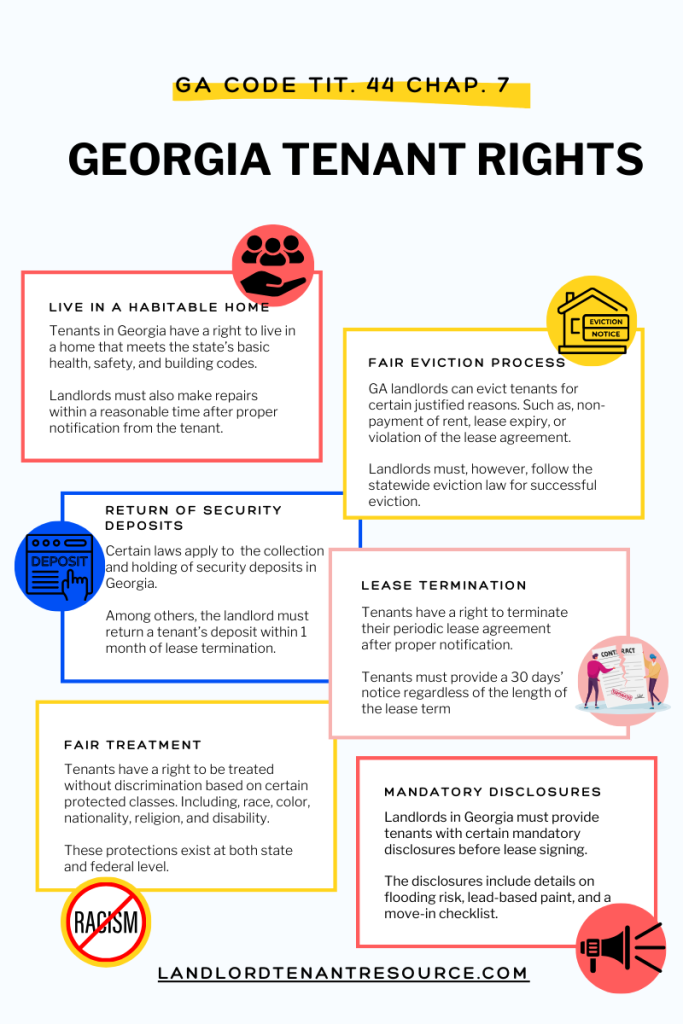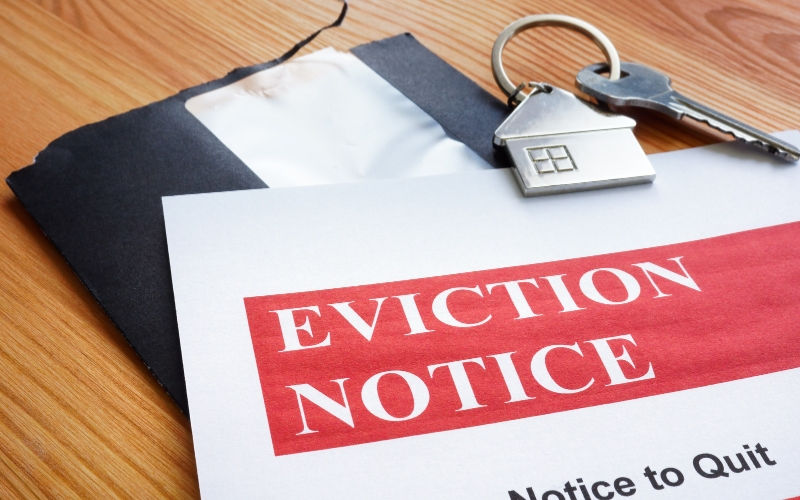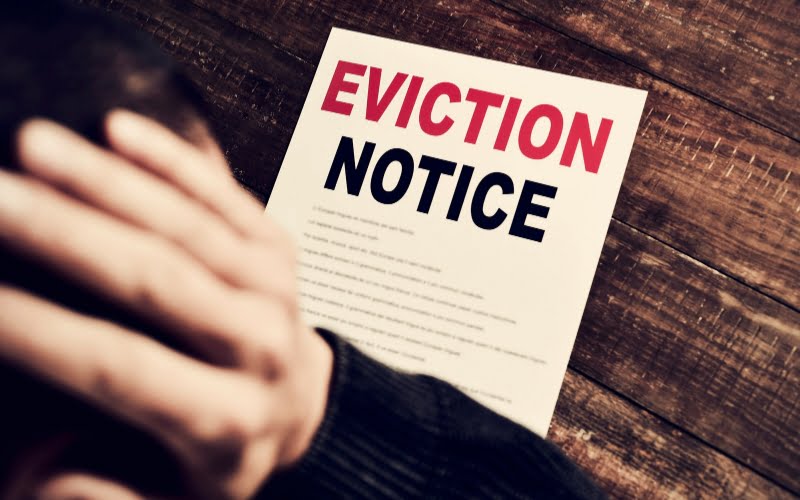Last Updated on May 29, 2024 by Kelvin Nielsen
Is your Georgia landlord trying to evict you from your rented premises? If so, you may be able to stop it!
For successful eviction, Georgia landlords must follow a specific process outlined under state law (GA Code Title 44 Chapter 7). If they don’t, that could give the tenant a chance to delay or entirely stop their eviction.
Now, to know how to stop your eviction, you must first understand how the tenant eviction process in Georgia works. In today’s guide, we’ll walk you through everything you need to know in this regard.
How Does The Tenant Eviction Process Work In Georgia?
The following is a basic overview of the process Georgia landlords must follow when evicting tenants from their rented premises.
1. Legitimate reason for eviction
Georgia landlords can evict tenants for several reasons. Including, for failing to pay rent on time, violating a term of the lease agreement, or even for refusing to leave after the lease is over.
In other words, your landlord cannot try to evict you for no reason in Georgia! Furthermore, the landlord cannot try to evict you illegally by engaging in “self-help” eviction tactics. Such as, locking you out, throwing out your personal belongings, or shutting down your utilities.
Evictions borne out of retaliatory actions or discrimination based on federal- or state protections are also illegal.
2. Eviction Notice
This is the second step in the Georgia eviction exercise. The eviction notice must be relevant to the violation you’ve committed. For instance, if the landlord is evicting you for failing to pay rent, they must serve you a 3 Day Notice to Quit.
If you pay the rent balance within the 3 days, the landlord must stop further eviction proceedings against you.
3. Eviction Lawsuit
If you fail to fix the violation within the notice period, the landlord can choose to continue with the eviction by filing an eviction lawsuit.
A process server will then need to serve you a copy of the summons and complaint. After receiving the copy, you’ll have 7 days to provide the court with an answer. This is optional. However, if you choose not to, then the court will probably render a default judgment in favor of your landlord.
4. Court Hearing
Georgia law doesn’t specify how long an eviction hearing must be held after the summons and complaint are served. This will entirely depend on the schedule of the court.
If the judgment favors your landlord, the court will issue them with a writ of possession. Fortunately for you, you’ll still have 7 days to appeal the court’s decision after judgment.
How to Stop an Eviction in Georgia
With all that in mind; now, how do you stop or delay an eviction? Here’s how you can do that!
1. Talk with your landlord.
Talk to your landlord and let them know your situation. If it’s nonpayment of rent, let them know that you’re working towards paying the balance. You may even want to come to an agreement.
If it’s a lease violation, such as keeping an unauthorized guest, let the landlord know that they are on their way out.
2. Respond to the eviction notice.
Eviction notices will usually have a timeframe on when a violation must be fixed to avoid eviction. As such, review it closely and pay attention to the deadline. For example, in the case of nonpayment of rent, the eviction notice requires that the rent balance be paid within 3 business days.
3. File an answer to the summons.
If the landlord escalates the matter by filing a lawsuit, the court will issue them with a copy of the summons and affidavit. This will allow you to file an answer. You may file it either verbally or write it down on a copy of the affidavit.
Filing an answer will give you an opportunity to explain why you think you shouldn’t be evicted from your rented premises. The following are legitimate reasons to stop or delay an eviction in Georgia.
- The eviction was discriminatory based on protected classes, such as race, color, sex, nationality, and religion.
- The eviction was in retaliation to exercising your legal right. Such as, forming or joining a tenants’ organization to advocate for your rights, or after complaining to a local health government agency for habitability issues.
- The eviction didn’t follow the due process. For example, the landlord didn’t serve you the proper eviction notice.
- You fixed the violation within the required time. If you fix the violation, for instance, within the deadline, the landlord must not continue the eviction process.
4. Attend the court hearing.
If you fail to do so, the court will issue a default judgment in favor of your landlord. On D-day, make sure to carry as much evidence as you can to support your case.
Including, a copy of the lease agreement, receipts showing payment of rent, evidence contesting an accusation, or even reports from inspectors highlighting code violations.
5. File an appeal.
If the court’s judgment is in the landlord’s favor, you may still be able to file an appeal to stop your eviction. You will have exactly 7 days to do so after the judgment is issued.
When filing an appeal against an eviction in Georgia, you must keep in mind a few things.
- To obtain the right to appeal the eviction ruling, you must have filed an answer and appeared for the initial hearing.
- You must file the appeal within 7 days after the judge issues the order.
- Filing an appeal in Georgia will cost you about $250. You will also need to obtain the necessary paperwork from the clerk’s office.
- You could be eligible for financial assistance. This could help waive the filing fee.
- You may still need to vacate your rental premises even after filing an appeal. In Georgia, appeals don’t stop eviction court orders.
6. File for an eviction hardship extension.
An eviction hardship extension can come in handy during a period of distress. This can help you temporarily continue living on your property even after the court orders your eviction.
The hardship extension can provide you the much-needed time to sort things out. For instance, get the extra time to catch up on a rent payment.
Please note, however, there is an eligibility criteria for eviction hardship extension in Georgia. You must truly demonstrate that you’re facing genuine financial hardship that is preventing you from meeting your rent obligations.
You can do so by providing proof of things like medical bills, job loss, and unexpected expenses.
After you’ve filed your request, the court will review the evidence adduced and make the appropriate decision. There is no timeline for the ruling and will depend on the caseload.
Frequently Asked Questions (FAQs) : How to Stop An Eviction in Georgia
Q: Can a landlord in Georgia evict you for no reason?
A: No, a landlord in Georgia cannot evict you for no reason. A landlord must have a legitimate reason for eviction. Such as, the tenant’s failure to pay rent, engaging in illegal activity, or violating the lease.
Q: What are my rights as a tenant in Georgia?
A: Georgia tenants have a smorgasbord of rights under the state’s landlord-tenant laws. Here is a brief overview to get you started.

Q: What are illegal things a landlord cannot do in Georgia?
There are several things a landlord cannot do under federal- and state laws. You can learn more here.
Conclusion
There you have it – how to stop an eviction in Georgia. If you have a question or need expert help in stopping an impending eviction, please get in touch with a qualified lawyer.
Disclosure: The content herein isn’t a substitute for advice from a professional attorney. It’s only meant to serve educational purposes. If you have a specific question, kindly seek expert attorney services.
Sources: GA Code Title 44 Chapter 7, Georgia Landlord-Tenant Handbook

Hi, I’m Kelvin Nielsen, an experienced landlord and accomplished real estate lawyer. My focus is on answering your questions about renting in the hopes of making your life as a renter or a landlord a bit easier.







